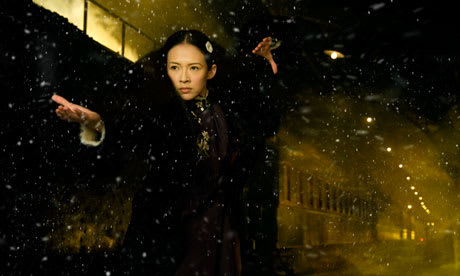On the heels of a recent glut of work about deified Wing Chung master Yip Man (five, plus two TV shows), Wong Kar-wai (In the Mood For Love) weighs in on the subject with his first full-length film since 2007's disastrous overseas excursion, My Blueberry Nights.
As one might surmise, his is an arty, borderline pretentious take on the life of Bruce Lee's teacher. Unfortunately for those hoping Wong might pull free of his creative stagnation to deliver the definitive statement on the man behind the growing legend, The Grandmaster is tepid and unfocused, and Wong's style is ill suited to capturing action. His tendency to seek intimacy in every shot hinders the sense of spatial coherence essential to visually process intricate physical exchanges.
Taking a broad overview of the kung-fu icon's life — from a myth-building look at his emergence as a paragon of his craft to becoming Lee's teacher — the film is overstuffed and rushed, even at two hours. It's almost as if Wong had a much longer, more complex movie in mind and, for whatever reason, wasn't able to achieve it.
What made it on screen is full of beautiful individual moments and deeply emotional performances, but Wong explores too many avenues at once to get a rounded sense of Yip Man as a warrior, political and culture figure, a man and lover, giving only snippets of each. This distances the audience from the character, which is problematic, considering that Wong finds a highly personal story of unfulfilled love and infidelity in Yip Man's history to satisfy his personal obsessions as an uncompromising auteur.
Most viewers will recognize the stubborn happiness-at-the-expense-of-pride trade-off trope from Crouching Tiger, Hidden Dragon, so it's frustrating that Wong doesn't go much deeper with his examination of love and honour, opting to pad the emotional core of the film with clunky, expository history lessons — the flow of the story is frequently interrupted by large chunks of text explaining gaps in time, including all of the political background regarding Japan's WWII invasion of China — and often poorly conceived and choppily edited martial arts sequences.
Again, it's a frustratingly inconsistent experience. For as many blurry, darkly lit fight scenes and grainy slow motion close-ups of water dripping from Yip Man's hat brim there are elegantly staged shots and graceful physical manoeuvres interspersed.
The Grandmaster actually improves as it jerkily jumps along like a lengthy flipbook bereft of numerous essential pages, most notably in the action choreography — Ziyi Zhang's final fight to reclaim her family's legacy is nearly breathtaking — but thematically as well.
The narrative almost comes together at the end, resonating with a wistful sense of hope despite great loss, until Wong feels the need to abruptly jump forward again to remind the audience that Yip Man is famous because Bruce Lee is legendary, undermining what the movie is actually about out of a sense of obligation to the cult of celebrity.
(eOne)As one might surmise, his is an arty, borderline pretentious take on the life of Bruce Lee's teacher. Unfortunately for those hoping Wong might pull free of his creative stagnation to deliver the definitive statement on the man behind the growing legend, The Grandmaster is tepid and unfocused, and Wong's style is ill suited to capturing action. His tendency to seek intimacy in every shot hinders the sense of spatial coherence essential to visually process intricate physical exchanges.
Taking a broad overview of the kung-fu icon's life — from a myth-building look at his emergence as a paragon of his craft to becoming Lee's teacher — the film is overstuffed and rushed, even at two hours. It's almost as if Wong had a much longer, more complex movie in mind and, for whatever reason, wasn't able to achieve it.
What made it on screen is full of beautiful individual moments and deeply emotional performances, but Wong explores too many avenues at once to get a rounded sense of Yip Man as a warrior, political and culture figure, a man and lover, giving only snippets of each. This distances the audience from the character, which is problematic, considering that Wong finds a highly personal story of unfulfilled love and infidelity in Yip Man's history to satisfy his personal obsessions as an uncompromising auteur.
Most viewers will recognize the stubborn happiness-at-the-expense-of-pride trade-off trope from Crouching Tiger, Hidden Dragon, so it's frustrating that Wong doesn't go much deeper with his examination of love and honour, opting to pad the emotional core of the film with clunky, expository history lessons — the flow of the story is frequently interrupted by large chunks of text explaining gaps in time, including all of the political background regarding Japan's WWII invasion of China — and often poorly conceived and choppily edited martial arts sequences.
Again, it's a frustratingly inconsistent experience. For as many blurry, darkly lit fight scenes and grainy slow motion close-ups of water dripping from Yip Man's hat brim there are elegantly staged shots and graceful physical manoeuvres interspersed.
The Grandmaster actually improves as it jerkily jumps along like a lengthy flipbook bereft of numerous essential pages, most notably in the action choreography — Ziyi Zhang's final fight to reclaim her family's legacy is nearly breathtaking — but thematically as well.
The narrative almost comes together at the end, resonating with a wistful sense of hope despite great loss, until Wong feels the need to abruptly jump forward again to remind the audience that Yip Man is famous because Bruce Lee is legendary, undermining what the movie is actually about out of a sense of obligation to the cult of celebrity.
